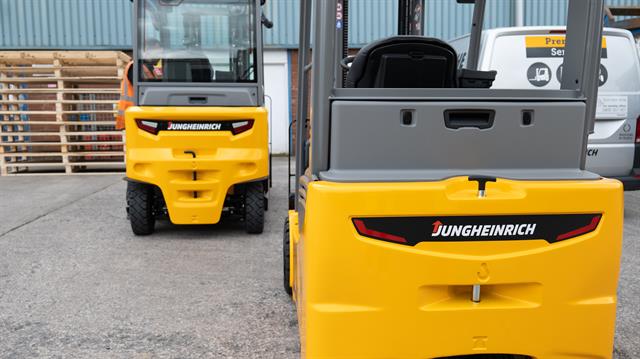 DoorCo's new forklifts expected to reduce the company's carbon dioxide equivalent emissions by almost 840 T
DoorCo's new forklifts expected to reduce the company's carbon dioxide equivalent emissions by almost 840 TBritish composite door supplier DoorCo got more than it bargained for when it swapped its ageing fleet of 18 LPG forklifts to Jungheinrich electric models.
DoorCo says it was originally looking for new forklifts to help it cut costs and operate more sustainably.
But Richard George, DoorCo’s head of health and safety, quality and environment, says the company reaped even more benefits than it expected from upgrading its forklift fleet, particularly in terms of safety.
George says Jungheinrich’s telematics allows the company to be proactive when it comes to forklift safety in its busy warehouses.
Every day, DoorCo moves around 2,500 doors, with each pallet of 25 doors weighing close to a tonne.
"Operators can't start the truck until they've completed their safety checks,” he says.
“If they have a bump in the truck, it's recorded. We can spot negative operator trends before they result in an accident.
“All of that is a major advantage when it comes to managing health and safety.
“We don't want to be reactive, and I certainly don't want to measure accidents. I want to measure something that tells me we're heading towards an accident so we can intervene and prevent it.”
George urges other companies to think outside the box when upgrading their materials handling fleet.
"I would say maximise your vision of what a fleet can be,” George says.
“It's not just about moving a load from A to B — any truck can do that. Think what else you can gain, what opportunities you can unlock and how to maximise them. Then, create your ‘wish list' and your ‘non-negotiables'.
"That made it really easy to cut through a lot of the noise and work our way towards Jungheinrich who had a solution that actually met our needs."
George says as well as assisting DoorCo to switch to lead-acid forklifts, Jungheinrich provided a comprehensive breakdown of the carbon the company would save with an electric fleet.
"We were looking at savings of almost 840 T of carbon dioxide equivalent over the life of the contract,” he says. “That was huge for us."